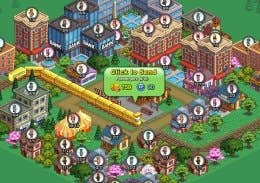All Aboard - Part One
A Bit Lucky's Frederic Descamps and Jordan Maynard on the rise of a Facebook developer
As the extent of the success of some companies based predominantly on the Facebook platform has emerged in the past year, another start-up could be on the same tracks as the likes of Zynga, Playdom and Playfish - but with a couple of crucial differences.
Here, Frederic Descamps, CEO and Jordan Maynard, chief creative officer, explain the origins of A Bit Lucky, the increasing success of first title Lucky Train, and why they think they can usher in a new era of gaming for the social network.
We got started in November of last year - Jordan and I met at Trion Worlds, where Jordan was one of the first technical hires. He was the senior director of technical game design on their first game, and was there for around three and a half years.
I was at Trion for a year and a half, and was the head of marketing and community management - and we left on very good terms, by the way.
One of the main ideas behind the company is that, as you know, social gaming has emerged almost as a separate field from gaming - and started for the most part by people who aren't from gaming. It grew very quickly, and you know better than I do about Zynga, Playdom, Playfish and so on, and they didn't even exist three years ago - but now they're really big companies making lots of money, with lots of users and several games published.
So we looked at the emergence of social gaming with great interest - especially the third generation - and there are a few things we've learned. One, it's a very fast-growing space - the fundamentals are super-strong. When you hear some people doom-saying about the space, or thinking it's a fad... well, not so.
Even if you take Facebook alone, you have 275 million people playing games. 275 million. Facebook is the single largest gaming platform in the world, and will probably remain so for a long, long time.
The other thing is that most of these players weren't gamers even a year ago, so this is a completely new field with lots of opportunities. When you look at the first crop of games, a lot of people were saying not too long ago that social gaming is very different from other gaming - the games and players are both different, so therefore they should be considered completely separate.
We both come from hardcore gaming - we're hardcore gamers, we've played all the games, whether it's World of Warcraft, or Minecraft, etc. When we looked at the space we were very surprised by a few things.

One, we saw the emergence of behaviour that was very similar to behaviour we've seen in gaming before - bragging rights, friendly competition, collaboration with your friends, and of course an addiction to certain games.
The other thing was that the incumbents - the first people on this stage - had done fantastic things and we have lots of admiration for them, but overall we thought that the first crop of third generation games on Facebook was, to put it mildly, a bit disappointing in terms of production quality, graphics and animation, but also in terms of gameplay mechanics - they were very simplistic.
But one of the most surprising things was the fact these supposedly social games weren't that social - they were called "social" because they sat on networks... but coming from Counter-Strike, World of Warcraft or even board games, all of those genres are way more social than any social games available when we started the company.
The fact that the space was growing super-strong... we still believe that's the case today. It's maybe the end of the beginning, but it's still the beginning - and a new generation of games is growing up. We want to be that new generation, especially as we think there are a lot of innovations possible in terms of bringing new, high quality, truly social games to Facebook.
So - we want to combine the best DNA of traditional games, which is fun, entertainment, engagement, compelling IP and also multiplayer gameplay - with the best DNA of social gaming, which is about iteration, being enlightened by the matrix.
One of the big appeals for me of the social gaming space was the development iteration cycles, which are completely different to my previous experience. We started full development of the game in late January and we 'shipped it' in four or five months... that's completely different from traditional development, and very exciting.
And then what we shipped was really the base footprint of the game - something to build on top of and fill out, and we've been doing that since, with content and feature releases. That's one of the reasons why I want to get into this space and try and do something with a faster development capability.








